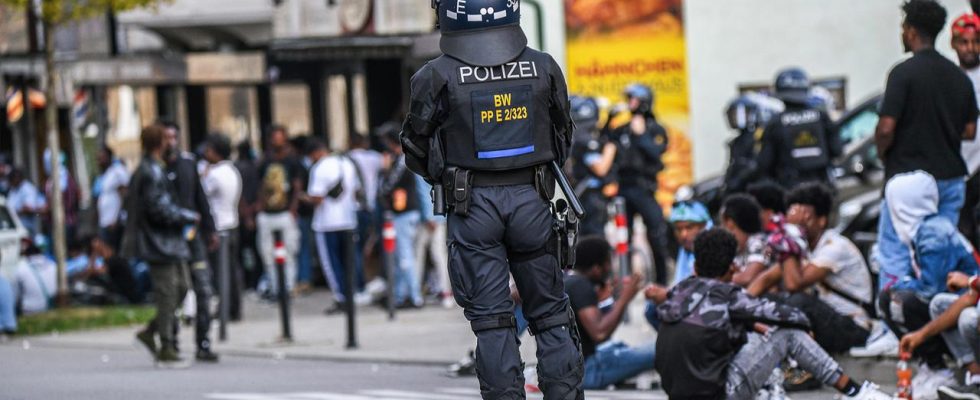In the diaspora there are repeated violent clashes between Eritreans loyal to the government and those in the opposition. So-called independence festivals are supposed to bring in foreign currency for the state – that’s exactly what some compatriots want to prevent.
Violent commotions, injured police officers, Eritreans attacking their compatriots: after riots last weekend, the city of Stuttgart canceled a planned Eritrean festival. There had previously been riots in Giessen and Stockholm. The fact that the Eritreans in exile are so unforgiving towards each other is due to their irreconcilable positions towards the government.
30 years ago, the country in the Horn of Africa fought for independence from Ethiopia in a decades-long war. Since then, President Isayas Afewerki has ruled the country in a one-party dictatorship.
His supporters celebrate the now 77-year-old, who led the so-called Eritrean Liberation Front, as a freedom fighter. His opponents accuse him of betraying the fighters for an independent Eritrea with his repressive policies.
Eritrea is one of the poorest countries in the world. It is agricultural. In addition to the political situation, the almost four million citizens also suffer from the ongoing drought. Most Eritreans rely on help from their relatives living in the diaspora.
Festivals bring important foreign currency
The government also finances itself largely from remittances from Eritreans abroad. The so-called diaspora tax amounts to two percent of income. Many people also pay if they are opponents of the government – out of fear that their relatives who are still at home might otherwise suffer.
For the isolated country, the donations collected at the Eritrea festivals in Germany bring important foreign currency into the country. The organizers are Eritreans who fled during the war of independence in the 1990s. They are on the side of the Eritrean government.
The protesters, on the other hand, fled precisely from this regime. And many of them still feel persecuted and spied on in Europe. Or they fear for their relatives who are still in Eritrea. They therefore want to prevent this government from receiving any form of support.
General conscription and forced labor
Internationally, Eritrea is largely isolated. There is neither a parliament nor independent courts or civil society organizations. Reporters Without Borders’ 2023 press freedom ranking ranks Eritrea 174th out of 180.
Those who are against the government and fight for democracy often disappear into secret prisons for an indefinite period of time – without trial or charge. The well-known Swedish-Eritrean activist Vanessa Tsehaye, for example, reported to the UN Human Rights Council in March about the fate of her uncle Seyoum, who has been imprisoned for more than 20 years.
There is also strict compulsory military service from the age of 18 for men and women. It’s not just about military service, but also about forced labor – such as in agriculture or road construction. The population is, so to speak, generally mobilized for an indefinite period of time.
Those who refuse expose themselves and their families to reprisals, as the UN Human Rights Council reports. The president justifies the high level of militarization with the alleged constant danger of war with Ethiopia. Many people flee abroad because of this obligation to serve – and also because they are being recruited for armed conflicts.
President seeks closeness to Russia and China
Eritrea is also involved in the war for control in Ethiopia’s Tigray region, in which it is estimated that hundreds of thousands of people have died so far. Eritrea sent troops to fight the regionally ruling Tigray People’s Liberation Front (TPLF) in the neighboring country alongside the Ethiopian central government.
Even after the peace agreement at the end of 2022, President Isayas Afewerki still refuses to withdraw his troops, which are held responsible for many human rights violations. The TPLF, which was in power during Ethiopia’s war of independence, remains a bitter enemy for him today, whom he accuses of being “Washington mercenaries” who maintained Western hegemony in the Horn of Africa.
At a rare international appearance at the Africa Climate Summit in Nairobi a few weeks ago, Isayas Afewerki said: He urged everyone not to be seduced by the billions of dollars promised by so-called benefactors and to break away from Western dependence.
Isayas Afewerki and Vladimir Putin at the Saint Petersburg Economic Forum.
Instead, Eritrea is increasingly seeking proximity to Russia and China – and is thus stylizing the conflict in Tigray as a trench warfare against the West. The fact that the German-Eritrean Society shares the President’s opinion in this regard can be found on the website of the Eritrean Ministry of Information.
Activist Vanessa Tsehaye is only 27 years old, but has little hope for change: She wonders whether she will see a free Eritrea in her lifetime.

